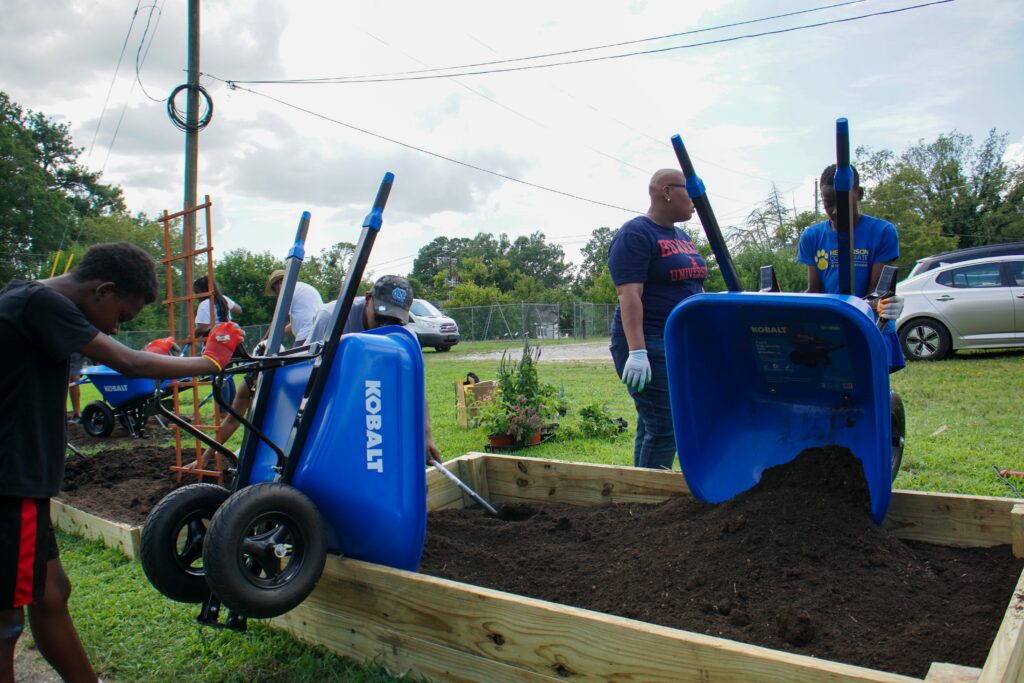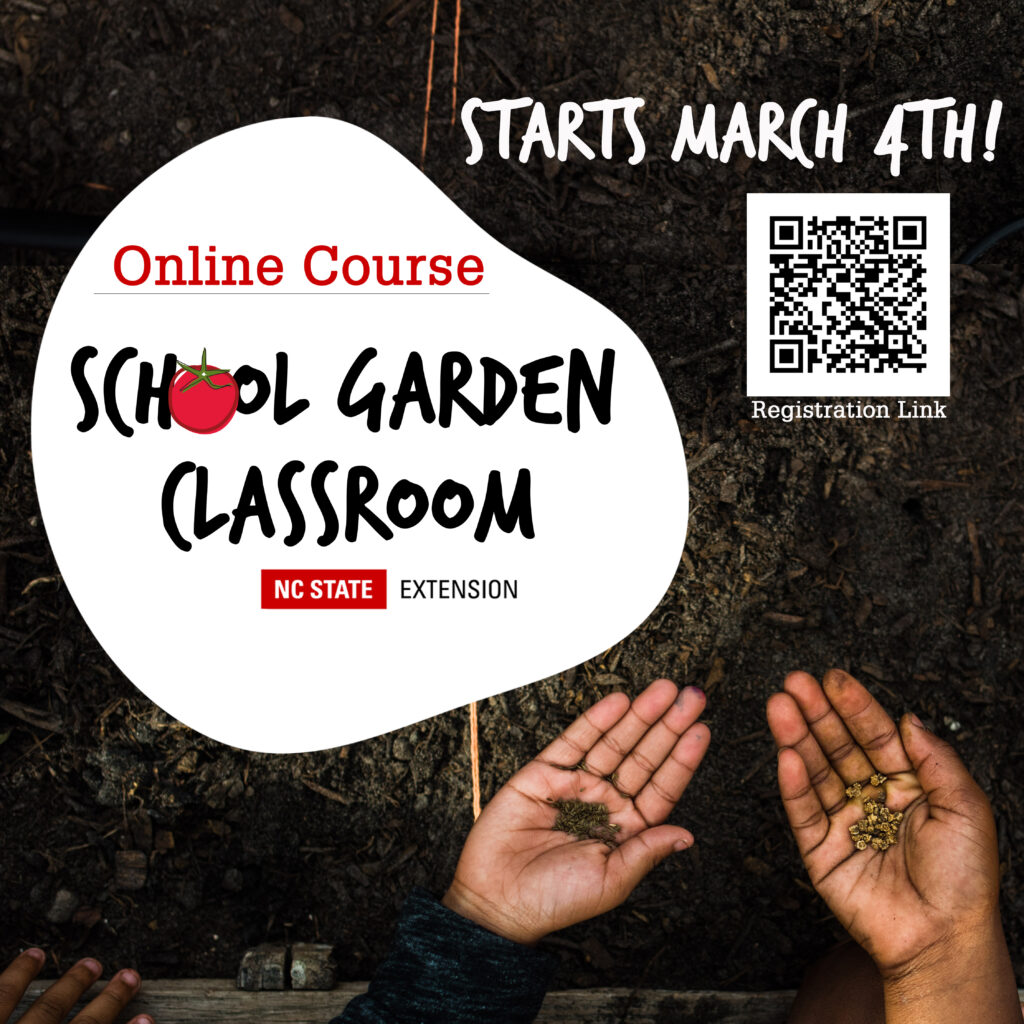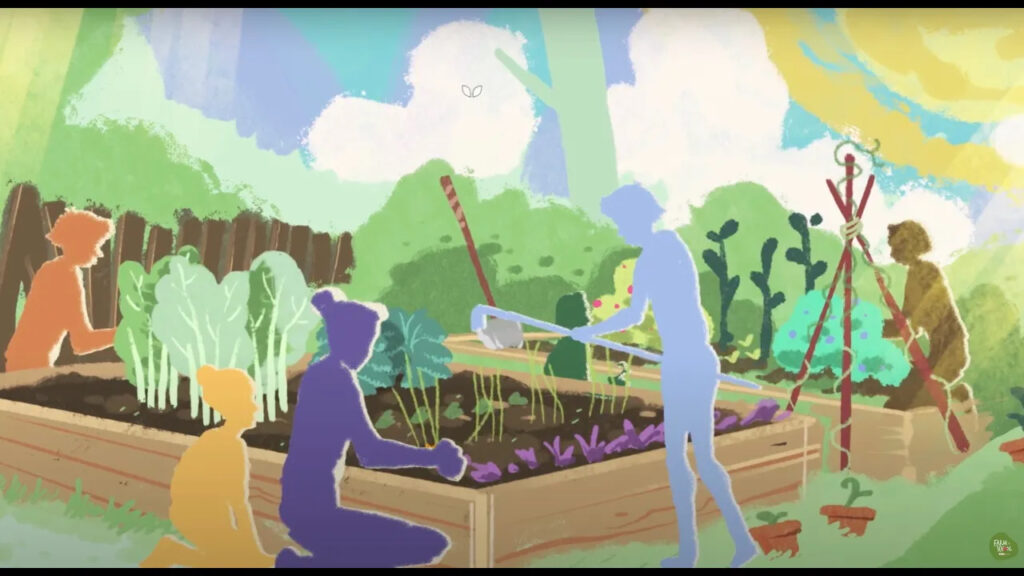Extension Grows School Gardens Through New Online Course
go.ncsu.edu/readext?985636
en Español / em Português
El inglés es el idioma de control de esta página. En la medida en que haya algún conflicto entre la traducción al inglés y la traducción, el inglés prevalece.
Al hacer clic en el enlace de traducción se activa un servicio de traducción gratuito para convertir la página al español. Al igual que con cualquier traducción por Internet, la conversión no es sensible al contexto y puede que no traduzca el texto en su significado original. NC State Extension no garantiza la exactitud del texto traducido. Por favor, tenga en cuenta que algunas aplicaciones y/o servicios pueden no funcionar como se espera cuando se traducen.
Português
Inglês é o idioma de controle desta página. Na medida que haja algum conflito entre o texto original em Inglês e a tradução, o Inglês prevalece.
Ao clicar no link de tradução, um serviço gratuito de tradução será ativado para converter a página para o Português. Como em qualquer tradução pela internet, a conversão não é sensivel ao contexto e pode não ocorrer a tradução para o significado orginal. O serviço de Extensão da Carolina do Norte (NC State Extension) não garante a exatidão do texto traduzido. Por favor, observe que algumas funções ou serviços podem não funcionar como esperado após a tradução.
English
English is the controlling language of this page. To the extent there is any conflict between the English text and the translation, English controls.
Clicking on the translation link activates a free translation service to convert the page to Spanish. As with any Internet translation, the conversion is not context-sensitive and may not translate the text to its original meaning. NC State Extension does not guarantee the accuracy of the translated text. Please note that some applications and/or services may not function as expected when translated.
Collapse ▲Imagine kids giggling in the garden while tickling a worm or excitedly sharing the discovery of a carrot ready to harvest. These and many more stories unfold within NC State Extension’s new series of online courses focused on Farm to School. Bringing together the best of N.C. Cooperative Extension’s areas of expertise: agriculture, food, and youth development, the Farm to School team is developing numerous courses that build North Carolina’s capacity to deliver programming in school gardens, local food procurement, and nutrition education. The first course to launch is about school gardening, starting on March 4th, 2024. Highlighting stories from communities across the state, everyone is invited to enroll and explore building a school garden team, designing engaging spaces, planting, and managing the garden, as well as best practices for using the garden with youth.
Extension’s Farm to School Team is led by Remi Ham, Farm to School Extension Specialist, and Morgan King, New Hanover Extension Agent, Family Consumer Sciences. Both Ham and King share enthusiasm for how this course will help nurture farm to school programming in schools. Ham continues, “One of my favorite stories comes from N.C. Cooperative Extension,Vance County Center. Dr. Wykia Macon, County Extension Director, and her team have a long-standing partnership with the local Boys and Girls Club. They invited us to collaborate with them on a garden design for their after-school program to engage their youth in gardening and healthy eating. The youth had so many ideas to share and their leadership in working together to build their garden is something that will inspire many other young people going forward.” Dr. Macon adds, “The garden club youth are always excited to go out to the garden to see what’s growing and possibly take some produce home. We have cooked squash together using a recipe from our EFNEP educator. Some B&G Club garden club members are also training for the Dinah Gore Healthy Cooking competition, so they are learning more about identifying what is growing in the garden and how to cook it. We have also incorporated field trips to a local farm, Brown Family Farm, to allow the youth to talk to a farmer and see the different ways he grows his food. The kids are learning when to grow certain items. We recently removed the cucumbers, tomatoes, and okra and replaced them with kale, collards, cabbage, etc., which is all booming right now so we will probably be making some kale chips at some point soon, Figure 1.” By filming school gardening in action, the Extension team hopes to provide examples that inspire folks across the state to grow their own gardens and build further connections that offer continual opportunities for youth.

Figure 1. Vance County Boys and Girls Club youth spent a day with Vance County Extension and Extension’s Farm to School team building raised beds to support their after school garden club. Watch their garden grow on the Farm to School YouTube channel.
Other Farm to School Extension team members have leveraged their expertise to bring innovative content to the course. Heather Kelejian, Extension Agent, Agriculture – Therapeutic Horticulture for New Hanover County works with students with diverse abilities who often come with special needs in a school garden. Kelejian applies her decades of experience collaborating with youth to share best practices for the inclusion of all learners in the garden. She captures youth voices and actions that offer insight when considering how school gardens can serve as spaces where children of all abilities express themselves. She encourages multiple engagement approaches, allowing students to communicate and express themselves through various means, including touching, smelling, tasting, drawing, and pointing at pictures.
A core component of school gardens and farm to school is the collaborative nature of the work. No one understands this more deeply than Kirsten Blackburn, NC State Extension’s Farm to School Coordinator. Blackburn served as part of the FoodCorps NC program working exclusively with students and teachers as a garden and nutrition educator for numerous years. Blackburn brings a unique set of experiences on the local nature of farm to school and the critical strategies of facilitating collaboration within the garden for sustainability and relevance. As part of the course development, Blackburn has created key written resources aligned to course content like step-by-step guides for creating a school garden team, what farm to school can look like in different communities.
Allison Walker Allen, Farm to School team member and Randolph County Extension Agent, 4-H Youth Development, has also utilized her school gardening experiences to create many of the resources, such as garden curriculum and classroom management. Allen has school gardening programs in every elementary school in Randolph County and this extensive knowledge is applied in concrete activities that give one the confidence to try school gardening for themselves.
Not every school will have the interest or capacity to tend to an entire garden of vegetables. Team member Liz Driscoll, 4-H Specialist in the Departments of Horticulture, Crop and Soils and Entomology and Plant Pathology, visits a school that embraces strawberry gardening. Swift Creek Elementary in Raleigh, North Carolina, has been planting strawberries every September for the past twenty years and eagerly awaits their harvest come May. Students put on their farmer caps and head to the field to observe their crops, record data, and decide on strategies to optimize production. Driscoll, working with the teachers at the school developed a resource guide on Growing Strawberries in Schools. This resource and many other publications were written specifically to provide additional information to support practitioners in their farm to school programming. Along with technical publications, numerous lesson plans and curricula are provided to course participants so they can bring the educational standards to life.
Figure 2. Ever felt trapped in a classroom, lost amid textbooks, and worksheets…What if there was a way to make learning come alive? Where the only ceiling in this classroom is the wide open sky? Animations can bring Farm to School concepts to life in engaging ways.
True to the spirit of experiential learning that Extension is known for, the course features numerous interactive learning opportunities. In addition to professionally produced video assets, the team has invested in a few animations that bring farm to school concepts to life! One recent animated feature shows viewers the vast learning potential that can occur just outside the boundary of classroom walls, Figure 2. The animation distills big ideas around farm to school. It tangibly places them in an illustration that invites viewers to consider the possibilities that await in the garden for learning and collaborating.
With generous support from the USDA-NIFA FALSP program (Award #20227002637847), the Extension Farm to School team plans to expand from school gardens to building content in all areas of farm to school, such as local food procurement, nutrition education, and more. These courses will collectively form a training initiative that starts with online learning and will grow into in-person workshops and symposia in the future. To register for the Farm to School – Creating the School Garden Classroom course, starting March 4th, 2024, or for other resources, news and events, please visit the Extension Farm to School portal.




